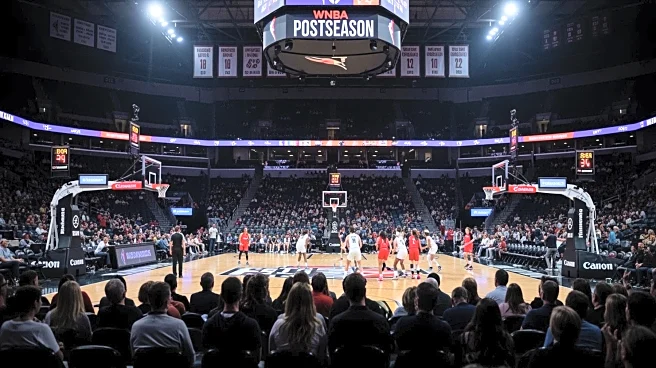What's Happening?
The Women's National Basketball Association (WNBA) postseason has achieved record viewership numbers on ESPN, as announced by the network. The 2025 playoffs were the most-watched in the league's history
on ESPN, averaging 1.2 million viewers across 24 games, marking a 5% increase from the previous year. The Finals series between the Las Vegas Aces and Phoenix Mercury was particularly notable, with Game 1 drawing 1.9 million viewers, the highest for a championship series game since 1997. The Las Vegas Aces, led by League MVP A'ja Wilson, secured their third championship since 2022 with a four-game sweep over the Phoenix Mercury. Despite a slight decline in overall Finals viewership compared to 2024, the series maintained a strong average audience of 1.5 million, ranking as the second-most watched Finals in history. Additionally, ESPN's WNBA Countdown pregame show saw a significant increase in viewership, averaging 437,000 viewers, a 30% rise from the previous year.
Why It's Important?
The record viewership for the WNBA postseason on ESPN underscores the growing popularity and visibility of women's sports in the United States. This increase in audience engagement reflects broader societal shifts towards greater recognition and support for female athletes and sports leagues. The success of the WNBA playoffs could lead to increased sponsorship opportunities, higher revenue, and more media coverage, further elevating the league's profile. For ESPN, the rising viewership numbers demonstrate the value of investing in women's sports programming, potentially influencing future broadcasting strategies and partnerships. The heightened interest in the WNBA also suggests a positive trend for gender equality in sports, encouraging more young women to pursue careers in athletics.
What's Next?
The WNBA's record-breaking postseason viewership may prompt the league to explore expansion opportunities, both in terms of team numbers and market reach. Increased media attention could lead to more lucrative broadcasting deals, enhancing the league's financial stability and growth prospects. Stakeholders, including team owners, sponsors, and broadcasters, are likely to capitalize on this momentum by investing in marketing campaigns and community engagement initiatives to sustain and further boost fan interest. Additionally, the success of the WNBA could inspire other women's sports leagues to adopt similar strategies to increase their visibility and audience engagement.
Beyond the Headlines
The WNBA's rising popularity may have broader cultural implications, challenging traditional gender norms and promoting inclusivity in sports. As more viewers tune in to women's basketball, it could lead to increased advocacy for equal pay and resources for female athletes, addressing longstanding disparities in the sports industry. The league's success might also influence educational institutions to prioritize women's sports programs, fostering talent development and encouraging participation at grassroots levels. Furthermore, the WNBA's achievements could serve as a catalyst for discussions on diversity and representation in sports media, prompting networks to diversify their programming and highlight a wider range of athletic narratives.









